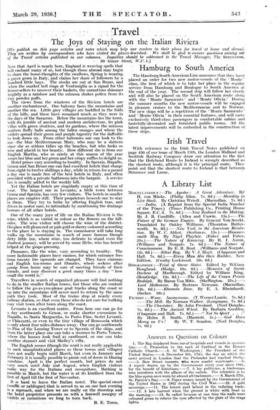The joys of Staying on the Italiau - Riviera (We publish
on this page articles and notes which may help our readers in their plans for travel at home and abroad'. They are written by correspondents who have visited the places described. We shall be glad to answer questions arising oat of the Travel _articles published in our columns. Inquiries should be addressed to the Travel Manager, The SPECTATOR, 99 Gower Street, TV.C.1.) Now. that April is nearly here, England is. weaving spells that will enchant many Of us; but though those abroad may begin to share the home-thoughts of the swallows, Spring is wearing a gayer gown in Italy, and claims her share of followers by a hundred little bays. The stocks are out at San Remo, and when the market bell rings at Ventimiglia as a signal for the flower-sellers to uncover their baskets, the carnations shimmer brightly as a rainbow and the mimosa shakes pollen from its tiny powder puffs. "
The views from the windows of the Riviera hotels are another enchantment. One balcony faces the mountains and another the sea. Little grey villages are huddled in the folds of the hills, and these have remained much as they were in the days of the Saracens. Below the mountains lies the town, with its jumble of ancient and modern architecture, its pink villas with green shutters, and its gardens, where the mimosa scatters fluffy balls among the fallen oranges and where the violets spread their green and purple tapestry for the daffodils to look down on. From other balconies one can look to the sea-the blue Mediterranean Mary, who may be a slattern since she so seldom tidies up the beaches, but who looks so wise and placid in her beauty. How different she is from our English Martha, who so rarely at this season of the year wears her blue and her green and her crispy ruffles to delight us.
Hotel prices vary according to locality. In Spezzia, Rapallo, Genoa and San Remo one can find excellent hotels that charge from eight to twelve shillings a day, while in return for a pound a day one is made free of the best hotels in Italy, and often provided with a private bathroom into the bargain. A service tax is usually added to the weekly bill.
Yet the Italian hotels are singularly empty at this time of year. The largest one in Levanto, a little town between Genoa and Spezzia, has very few visitors. The hotels in smaller places are emptier still. Their proprietors beseech one to stay in them. They try to bribe by offering English teas, and drives in motor cars, to intimidate by mentioning the drainage horrors of all other hotels.
One of the many joys of life on the Italian Riviera is the wine, which is as varied in colour as the flowers on the hill- sides. The wise visitor will choose the wine of the district. His glass will gleam red or pale gold or sherry-coloured according to the place he is staying in. The connoisseur will take long walks up the mountains in search of some famous though dirty little inn, where wine, too delicate to stand even the shortest journey, will be served by some Hebe, who has herself helped at the grape-pressing.
Pleasures, like the wine, vary according to locality. The more fashionable places have casinos, for which entrance fees from twenty lire upwards are charged. They have cinemas and English tea-rooms and libraries, where seekers after gossip from home may be sure of meeting friends of their friends, and may discover a good many times a day "how small the world is."
Travellers in search of organized pleasure will find nothing to do in the smaller Italian towns, but those who are content to follow the go-as-you-please goat tracks along the coast or up into the mountains will never need to return by the same path they took. Most of the trains stop at nearly every railway station, so that even those who do not care for walking may visit town after town along the coast.
Levanto is an excellent centre. From here one can go for a day northwards to Genoa, or make shorter excursions to Rapallo, to Santa Marguerita, to Porto Fino, Sestri Levanti, or Chiavanti, or even to the tiny village of Bonossola which is only about four miles distance away. One can go southwards to Pisa of the Leaning Tower or to Spezzia of the ships, and from the latter place one can take a steamer to Porto Venere, where the houses look frail as cardboard, or one can take another steamer and visit Shelley's villa.
The English season (though the word is not really applicable to such unsophisticated places as these towns and villages) does not really begin until March, but even in January and February it is usually possible to picnic out of doors in blazing sunshine. April is the perfect month, but prices do not vary much until July and August, when English visitors make way fOr the Italians and mosquitoes. Bathing is possible in March, but the water is at its kindliest from the first of April till the' first of November.
It is hard to leave the Italian hotei. The special sweet (souffle or zabliogne) that is served to us on our last evening is a reproach, and when we are really on the doorstep and the hotel proprietor presents us with a farewell nosegay of
violets or carnations we long to turn back.
B. E. TODD.














































 Previous page
Previous page